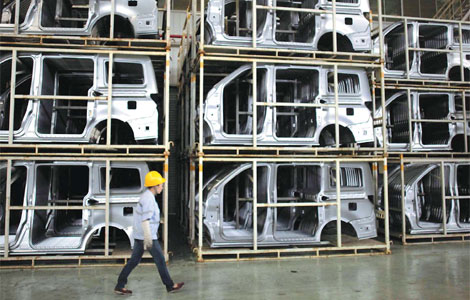Plug the flow of e-waste
Updated: 2013-06-20 07:55
(China Daily)
|
|||||||||||
That China has become the world's largest dump for electronic waste has underscored the urgent need to regulate its disorderly electronic waste processing and recycling market and plug the policy and legislation loopholes that have facilitated the inflows of e-waste.
According to a recent report co-drafted by the United Nations University and Tsinghua University, about 70 percent of the electronic waste generated worldwide, from scrapped televisions and refrigerators to computers and cell phones, ends up in China. A large portion of it is illegally transferred from the United States and elsewhere to China through ports or via Vietnam. Some e-waste also sneaks its way into the mainland through Hong Kong.
It is estimated that 3.62 million tons of e-waste were discarded in China in 2011. And considering the rapid increase in the consumption of electrical and electronic devices at home in recent years, as a result of improved living standards, the amount of e-waste that will need to be dealt with will further rise in the years to come.
A UN Environment Programme report in early 2010 warned that electronic waste comes with serious risks to the environment and human health unless proper disposal methods are employed.
However, due to a lack of suitable facilities, small and unlicensed workshops have so far played a major role in the processing and recycling of these huge amounts of e-trash. Without proper technologies, equipment and operating methods, disposal of electronic waste, which usually contains heavy metals such as lead and cadmium, is a health hazard to workers and a threat to the environment.
The recent exposure of rice with high cadmium content in Guangzhou, 400 kilometers away from Guiyu in Guangdong province, a town known as the e-waste capital, has raised concerns about e-waste's impact on food safety.
Facing the growing threat to the environment and public health from disorderly electronic waste disposal, the country should regulate e-waste processing and recycling, and increase funding and the technological input into the sector. The government should also work to raise public awareness of the risks involved in e-waste processing, and effective policy and legislation measures should be taken to halt the transfer of e-waste from other countries and regions.
Related Stories
Bamboo-made electronic products at Beijing fair 2013-06-01 17:12
China's electronic products trade rise 2013-01-01 11:00
Chinese farmers upset by rising rice imports 2013-06-05 00:36
Imports to shore up shipping 2013-05-29 08:03
Today's Top News
Xi meets UN chief
Talks establish fishery hotline
Cautious monetary stance to remain
Foreign buyers eye Chinese drones
City plan will grant migrants benefits
Yao looks to PwC for charity credibility
Space lesson to reach millions
A lost soul in a time of turmoil
Hot Topics
Lunar probe , China growth forecasts, Emission rules get tougher, China seen through 'colored lens', International board,
Editor's Picks

|

|

|

|

|

|





